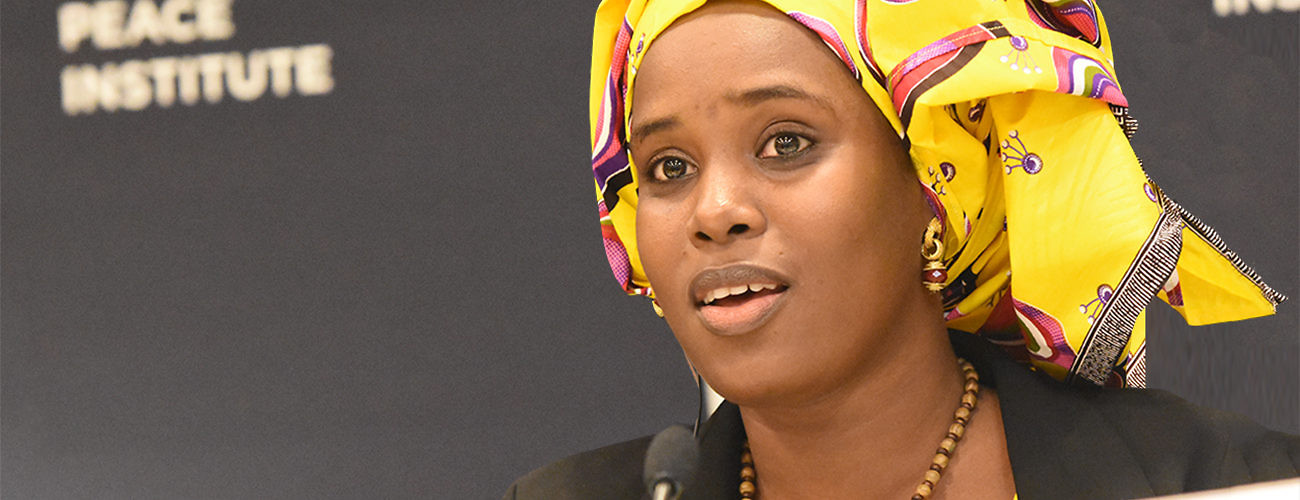This was a broad conclusion of a group of regional specialists speaking in a panel discussion at IPI on September 27th on investing in peace and preventing violent extremism in West Africa and the Sahel. The forum was a follow-up to a meeting on the same subject in June in Dakar.
The panelists agreed as a given that militarized responses were the wrong entry point for forestalling resorts to violence but stressed that even proper preventative measures could be ineffective if steps weren’t taken beforehand to incorporate the views of local individuals, with a particular emphasis on women and youth.
IPI Senior Adviser Youssef Mahmoud, moderator of the discussion, said that research into the vexing question of why so many individuals and groups find “liberation in violence” showed that “economic, social and political inclusion is the most important factor in preventing violent extremism.”
Djeinaba Touré, president of the association Je M’Engage in Mauritania, said that “social cohesiveness is the first source of resilience. It’s true that prevention is important, but prevention is just a step.”
She said that it was important too to gain the participation of people on an individual basis. “For a long time, we talked about networks, then we went from networks to talking about groups, from groups we talked about cells, and today we’re talking about individuals. That means this will be the solution at the heart of the problem.”
Aslam Souli, Vice President of Tunisia’s National Youth Initiative Against Terrorism, said that his group had discovered that the best way to engage youth on the ground was through “community dialogues” on the issues that really mattered to them, which tended to be things like lack of local services, bad governance, inequality, and corruption. “Believe me,” he said, “the issue of violent extremism comes at number 10 or 11. Violent extremism is only a symptom.”
Mohamed Ibn Chambas, the Special Representative of the Secretary-General and head of the UN Office for West Africa and the Sahel (UNOWAS), affirmed the view that “security measures alone cannot resolve the underlying problems of violent extremism” and that “alternative approaches focused on community engagement are equally essential to achieving lasting results.”
Listing some of the ways that extremists and Jihadi groups seek to lure recruits, particularly young ones, he cited promises of money and partners, provision of social services, opportunities for personal development, appeals to religion, and pledges to protect their families and possessions.
Ahmed Labnouj of Interpeace, Libya said that Libya presented a particularly perilous landscape for investing in peace and taking preventative steps because of the institutional breakdown of the country. “We develop processes, we talk about working within institutions, but in Libya institutions no longer exist,”he said. “So we must ask what communities are doing to deal with violent extremism, and we also have to focus on leadership within the communities.”
And even well-meaning efforts to work at the community level were making another mistake, he said. “In our research, we focus on what’s wrong in the communities, but we pay little attention to what’s actually working. That’s a huge deficit. We tend to define the problems from our outside perspective as observers and analysts, but the question is, ‘How do the local communities actually see it?’”
To build community leadership that can have real impact, he said there was a need to engage more women. “We have seen in Libya how women often transcend a lot of divisions between communities, and they’re often the common denominator,” he said.
Mr. Souli took that thought a step further, saying that the best defense against the threat of young people being attracted to extremist violence was “well-equipped families,” particularly mothers.
“While working in Tunisia, for example, when you talk with returnees from conflict zones like Syria and ask them if they regret killing people, they don’t say they regret it, but when you ask them how they feel about what they did to their mothers, leaving at night and leaving them crying, they become very anxious. This is something we should work on and focus on – the role of mothers in preventing violent extremism.”
Jean-Daniel Bieler, the Swiss Foreign Affairs Department’s Special Adviser for Central Africa, said that in keeping with the UN Secretary-General’s plan of action for the prevention of violent extremism, his office emphasized “the will to accept plural societies, the diversity of identities and the recognition of the value of tolerance. All the stakeholders have to advance together, governments, citizens, civil society organizations, religious people, and armed groups, if they decide to be part of the dialogue and are ready to give up violence,” he said.
“Inclusion,” he concluded, “is key.”
Co-hosting the forum with IPI were the United Nations Office for West Africa and the Sahel and the Permanent Mission of Switzerland to the UN. Opening remarks were made by Olivier Zehnder, Deputy Permanent Representative of Switzerland, and Fodé Seck, Permanent Representative of Senegal.








